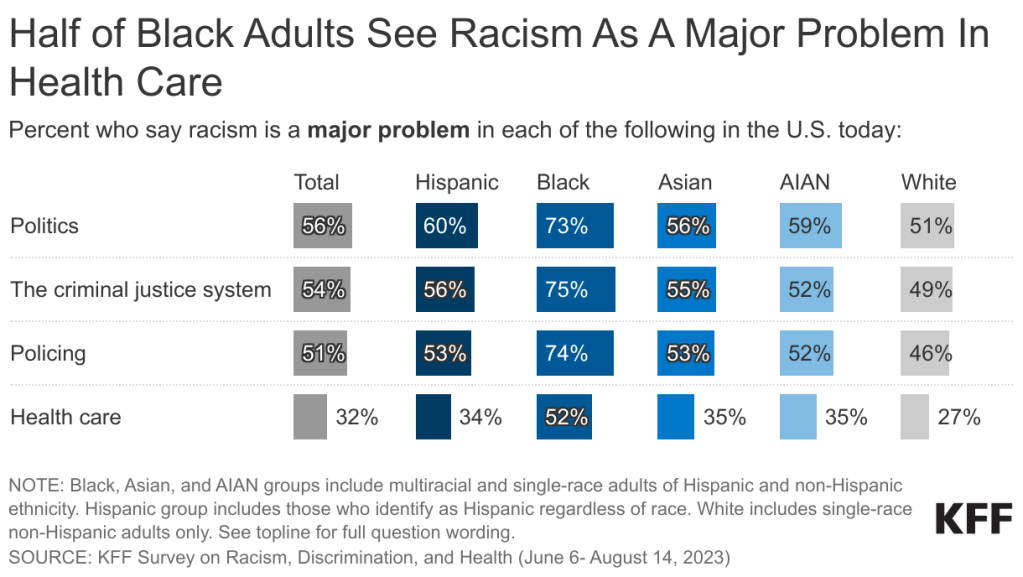About a third (32%) of the public view racism as a major problem in health care, fewer than say the same about politics (56%), the criminal justice system (54%), and policing (51%), a new KFF report on the public’s views of racism finds. The lower levels of perceived racism in health care may reflect high levels of trust in doctors and health care providers across racial and ethnic groups.
Overall, Black adults are much more likely than White adults to say racism is a major problem in each of these areas, while Hispanic, Asian, and American Indian and Alaska Native adults are generally somewhat more likely than White adults to say so.

Partisanship is one of the strongest predictors of views of racism in U.S. society, with White Democrats much more likely than White Republicans to see racism as a major problem across each aspect of society asked about in the survey. Among Republicans, Black, Hispanic and Asian adults are more likely than White adults to say racism is a major problem.
People who report experiencing racism or discrimination in their daily lives are much more likely to say racism is a major problem across different aspects of society, including in health care.
For example, among all adults, those who say they were treated unfairly or with disrespect by a health care provider recently are much more likely than those who haven’t to say racism is a major problem in health care (49% and 28%, respectively). The same pattern holds for Black adults (74% and 46%), Hispanic adults (58% and 30%), and Asian adults (48% and 33%).
Despite differences in views of racism in health care, about 7 in 10 adults across racial and ethnic groups say they trust doctors and health care providers to do what is right for them and their community all or most of the time.
Black adults, those with darker skin color, and adults who report experiencing unfair treatment in a health care setting are less likely than their counterparts to trust health care providers. Among Black and Asian adults, those who mostly visit health care providers who share their racial identity are more likely to say they trust providers than those who don’t.
The new report draws on data from KFF’s 2023 Survey on Racism, Discrimination and Health, which documents the extent and implications of racism and discrimination in society, including in people’s interactions with the health care system.
KFF also released two additional reports—one on racial disparities in access to medical advancements and technologies and another that examines how the history of policies and events have contributed to disparities, which builds upon an interactive timeline exploring history’s impact on health disparities.
The KFF Survey on Racism, Discrimination and Health is a probability-based survey conducted online and via telephone with a total of 6,292 adults, including oversamples of Hispanic, Black, and Asian adults conducted June 6-August 14, 2023. Respondents were contacted via mail or telephone; and had the choice to complete the survey in English, Spanish, Chinese, Korean, or Vietnamese. Survey methodology was developed by KFF researchers in collaboration with SSRS, and SSRS managed sampling, data collection, weighting, and tabulation. The margin of sampling error is plus or minus two percentage points for results based on the full sample; three percentage points for results based on Hispanic adults (n=1,775), Black adults (n=1,991) or White adults (n=1,725); five percentage points for results based on Asian adults (n=693); and eight percentage points for results based on American Indian and Alaska Native adults (n=267).

